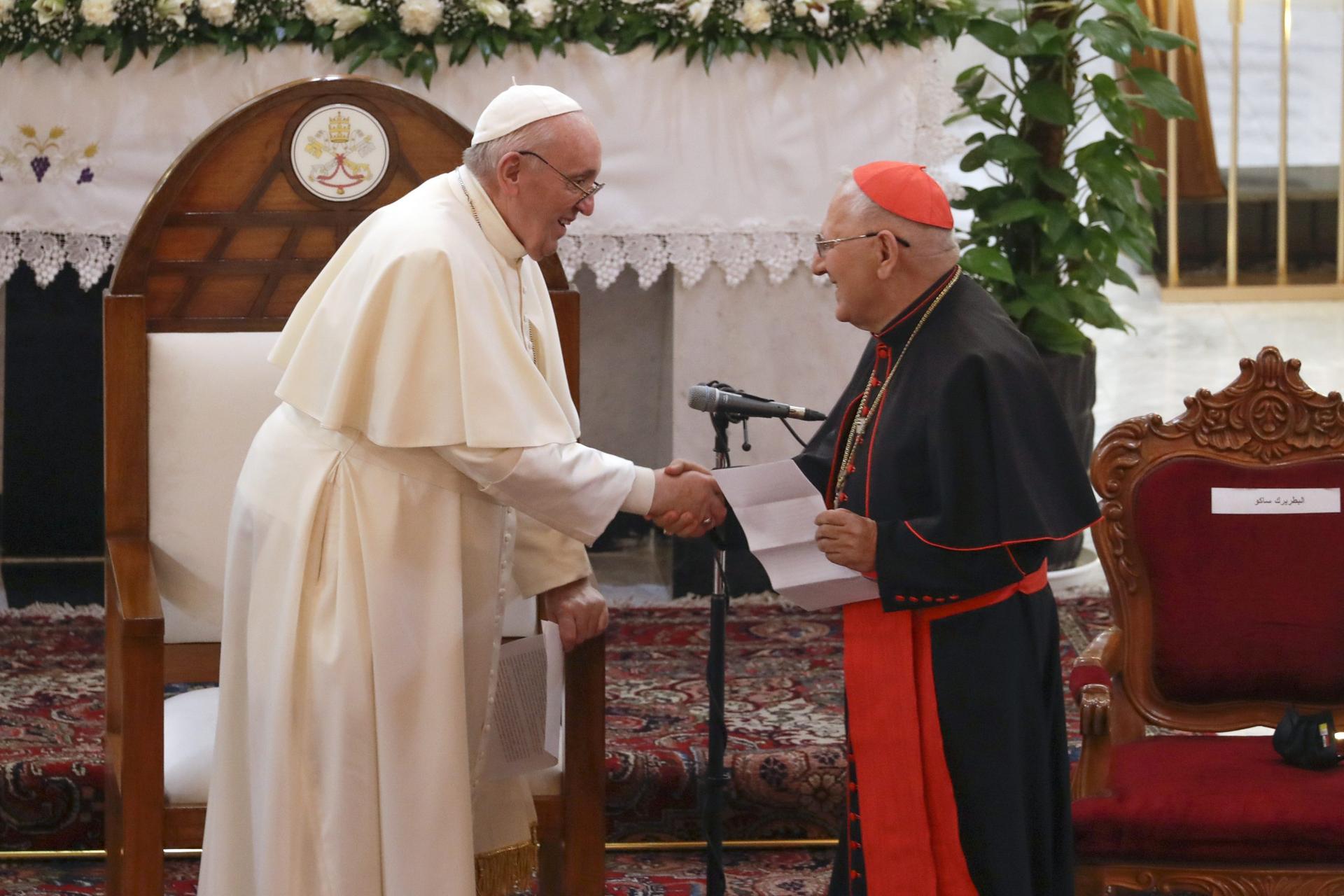ROME – Pope Francis has sent a letter to Iraqi Chaldean Patriarch Louis Raphael Sako voicing thanks for his visit to Iraq last month and praising the local church for its charitable activities and its role in working to rebuild the country.
The letter delivered Tuesday morning by the Vatican envoy to Iraq, Archbishop Mitja Leskovar, during a visit to the Chaldean patriarchate.
In the letter, Pope Francis thanks Sako and the entire Iraqi Church for “the warm and sincere welcome” he received during his March 5-8 visit, and for the commitment made “for the success” of the trip – a visit he said was “prepared, accompanied with prayer, and (was) a sign of true communion with the throne of Peter.”
“I still carry in my heart the memory of the meetings, of the moving moments of prayer, marked by fraternal commitment. In the days I spent with you, I heard voices of pain and anguish, but I also listened to voices of hope and consolation,” he said.
This, he said, is a fruit of the closeness of the Iraqi Church “to the believers entrusted to your care” and to the “charitable work that you carry forward with the various charitable organizations that help people in this country to work for its reconstruction and social rebirth.”
“I was able to see and touch with my hand how Christ is alive in the church in Iraq, working in his holy and believing people,” the pope said.
Francis ended his letter voicing hope that the Christian witness of Sako and the Iraqi church, “enriched by adversity and strengthened by the blood of the martyrs, will be a shining light inside and outside Iraq, to praise the greatness of God and the joy of the spirit of this people in God our savior.”
Sako, who wrote his own letter of thanks to Pope Francis several weeks after last month’s visit, is one of the most visible Catholic Church leaders in Iraq, and he played a key role in organizing the visit, during which the pope made stops in the cities of Baghdad, Erbil, Mosul, Najaf, Qaraqosh, and the Plain of Ur.
Pope Francis was also invited to a private meeting with Grand Ayatollah Sayyid Ali al-Husayni al-Sistani, one of the most influential authorities in Shia Islam, and his meeting with interreligious leaders on the Plain of Ur.
Most of his speeches during the trip touched on the need to overcome interreligious and ethnic conflicts and barriers, and to establish a stronger sense of national unity and brotherhood beyond one’s affiliations.
On the one-month anniversary of the papal trip, Sako published a lengthy reflection outlining his vision for Iraq’s future, suggesting, among other things, that a stricter separation between religion and the state be enforced.
In the reflection, Sako called the papal trip “an ideal opportunity that all Iraqis must take advantage of to return, with all their confessions and religions, to themselves and their patriotism.”
This involves “turning the page from the past and opening a new page for reconciliation” by strengthening a sense of national fraternity, respecting differences, fighting for peace, rebuilding the country’s crumbling institutions and allowing displaced people to return to their homes, he said.
Sako insisted that Iraqis, both “in principle and by constitution”, are all citizens “with equal rights and duties, and citizenship cannot be limited to religion, creed, region, race, or number.”
In this regard, Sako suggested that perhaps now is the time “to separate religion from the state and build a civil state, as the Christians West has done for a long time,” insisting that the creation of a civil or secular state “is not hostile to religion, but rather respects all religions, and does not include religion in politics.”
In a bid to further tear down barriers with the Islamic community, Sako made an appeal on behalf of Christians in an April 12 message to Muslims for the start of the month of Ramadan.
He voiced his hope that the month of Ramadan for Muslims would be “an opportunity to get closer to God and to people through fasting, prayer, acts of charity, mercy, forgiveness and reconciliation, and to deepen the bonds of brotherhood, friendship and respect that Pope Francis recalled during his visit to our country from 5 to 8 March.”
“On this occasion, I ask for the adoption of the denomination of Christians as ‘People of the Book,’ which must be included in textbooks used in national schools to replace other erroneous and unacceptable definitions,” he said.
In some schools in Iraq, Christians are still referred to as either “infidels” or “polytheists,” which have traditionally been phrases associated with anti-Christian sentiment within Islam.
Sako’s suggested alternative of denominating Christians as “people of the book,” a Koranic term that is frequently used in Islamic school texts.
In his message, Sako voiced hope that for Muslims, Ramadan would also be an opportunity to “promote the principles of peace, stability and coexistence, so as to open a new positive page in the life of Iraqis, so that everyone can enjoy happiness after all evils they have suffered.”
Follow Elise Ann Allen on Twitter: @eliseannallen














